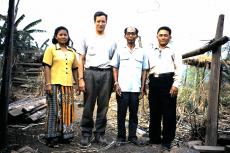In response to the Supreme Court of the United States having overturned a 1913 New York State statute that sharply restricted the carrying of concealed firearms in public, Gov. Kathy Hochul on Friday signed legislation bolstering the state’s concealed-carry restrictions.
The Supreme Court’s decision on New York State Rifle and Pistol Association v. Bruen, announced on June 23, ruled that requiring applicants to demonstrate a special need for self-defense was unconstitutional. The decision came amid a spate of mass shootings in the country, including the May 14 attack in which 10 people were murdered in a Buffalo supermarket. On Monday, seven people were killed and around 25 others shot and wounded during an Independence Day parade in a Chicago suburb.
The Gun Violence Archive defines a mass shooting as a single incident in which four or more people are shot, not including the shooter.
The package of new laws was crafted to align with the Supreme Court’s decision, which is “senselessly sending us backward and putting the safety of our residents in jeopardy,” according to a statement by the governor. The statement cited a National Bureau of Economic Research study issued in June concluding that violent crime involving firearms increases by 29 percent when people are given the right to carry handguns.
The new laws restrict the carrying of concealed weapons in locations deemed “sensitive” and establish that private property owners must expressly allow a person to possess a firearm on their property, with criminal penalties for violators. They also expand on eligibility requirements in the concealed-carry permitting process, including firearm training courses for applicants; allow the state to regulate and standardize training; establish oversight over background checks for firearms and regular checks on license holders for criminal convictions; create a statewide license and ammunition database, and strengthen and clarify the law relating to the sale of body armor to include hard body armor such as the type worn by the alleged shooter in the May 14 mass shooting in Buffalo.
Sensitive locations are defined as airports; bars and restaurants that serve alcohol; courthouses; day care facilities, playgrounds, and other locations where children gather; educational institutions; emergency shelters, including domestic violence and homeless shelters; entertainment venues; federal, state, and local government buildings; health and medical facilities; houses of worship; libraries; polling sites; public demonstrations and rallies; public transportation, including subways and buses, and Times Square in Manhattan.
The laws also make “no carry” the default for private property unless deemed permissible by property owners. Those owners who do decide to allow concealed carry will have to disclose with signs saying concealed carry is allowed on the premises.
The laws take effect on Sept. 1.
Also in the legislation is the creation of an appeals board for applicants whose license or renewal is denied or revoked. It will take effect on April 1, 2023.
Representative Lee Zeldin of New York’s First Congressional District, who will challenge the governor in the Nov. 8 election, issued a statement on Friday. “Just hours before Americans celebrate our independence this holiday weekend, Democrats controlling Albany are enthusiastically stomping all over the constitutional rights of law-abiding New Yorkers,” he said. “Instead of focusing on addressing the root causes of rising crime in New York, Kathy Hochul is obsessed on politically expedient lip service.”
“Gun violence is an epidemic,” East Hampton Town Supervisor Peter Van Scoyoc told The Star on Tuesday. “There are too many people in this society who really should not have access to firearms. The idea that people can have concealed carry, that doesn’t make me feel safe. You look at the number of people who get into arguments over traffic, road rage, or whatever, in the line at a grocery store . . . they just snap. It’s too easy in that moment just to act.”



